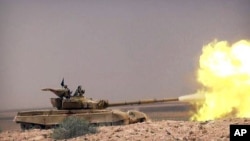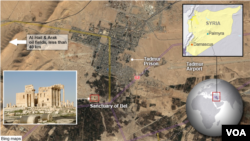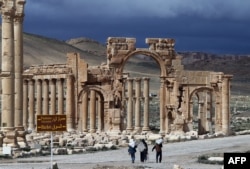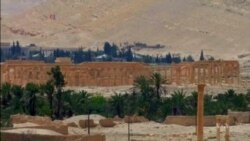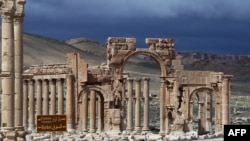Observers say Islamic State has captured the last Syrian-controlled border crossing between Syria and Iraq.
The British-based Syrian Observatory for Human Rights said Syrian forces fled the al-Tanaf crossing, giving the militants control of the border.
The monitors say Islamic State now controls about half of Syria after seizing the ancient city of Palmyra, putting its irreplaceable 2,000 year old artifacts at risk of destruction.
U.S. officials say the capture of the ancient Syrian city of Palmyra by Islamic State militants is "unfortunate gains" for the militant group.
Pentagon spokesman Colonel Steve Warren said Thursday the U.S. was unable to coordinate air support to help in the fight for Palmyra.
“We have no reliable partners on the ground in the vicinity of Palmyra, unlike in Kobani, where we did have some reliable partners and were able to focus air power in conjunction with ground forces,” said Warren.
The takeover immediately threatened Palmyra's 2,000-year-old UNESCO World Heritage Site with its towering colonnades, other ruins and priceless artifacts. The Islamic State fighters have demolished an array of antiquities in their advance across wide swaths of Iraq and Syria, claiming they are idolatrous to Muslim beliefs.
"This is the fall of civilization," Syrian antiquities chief Maamoun Abdulkarim said of the militants' takeover of Palmyra. "Human, civilized society has lost the battle to barbarism."
Frustration expressed
"I don't think we're losing," U.S. President Barack Obama said in an interview published Thursday in The Atlantic magazine.
But both Democrats and Republicans criticized U.S. strategy against the Islamic State after a hearing about the crisis on Capitol Hill.
“The United States seems so far to lack a coherent cogent strategy for dealing with it militarily or diplomatically, and my fear is that we will fail to act sufficiently promptly,” Connecticut Senator Richard Blumenthal told VOA.
Watch related video report from VOA's Zlatica Hoke:
The White House encouraged critics who have called for a change in the coalition strategy against the Islamic State to be “more specific.”
Republican Senator Lindsey Graham called for “night raids on a continuous basis, not going after one leader but all their leaders in a continuous fashion.” He also told VOA the U.S. needs to put “more American trainers and advisors, forward air controllers, on the ground in Iraq [to] give the Iraqi army a military edge.”
“I don’t think they [the critics] will find a lot of support for a large-scale deployment to re-invade Iraq or invade Syria,” White House spokesman Josh Earnest said.
Col. Warren said that as of Friday, the Islamic State had an overall loss of about 25 percent of its territory since the U.S. started air strikes last August. The U.S. has spent more than $2.1 billion on the war as of April 9, averaging $8.6 million per day.
In Washington, State Department spokeswoman Marie Harf said Thursday that the U.S. does not agree with the Syrian observatory's estimation that Islamic State controls half of Syria.
She also said the administration is balking at demands from some U.S. lawmakers to change the current strategy in Syria and Iraq to one that is more robust as Islamic State becomes more aggressive.
Harf said U.S. strategy has "taken out parts of their command and control. It's taken out their communications. It's taking out their majority funding source when it comes to taking out the oil ... so we have a strategy that is choking off their funding, that is taking off their fighters ... cutting off ways for them to get more foreign fighters, that's taking them off the battlefield every single day."
Ramadi retreat
Meanwhile on Thursday, the Islamic State pushed out Iraqi government forces east of the Iraqi city of Ramadi which they overran on Sunday after Iraqi forces retreated.
"There's no doubt there was a tactical setback," Obama said about the loss of Ramadi, adding that the city "had been vulnerable for a very long time, primarily because these are not Iraqi security forces that we have trained or reinforced."
Obama said the "training of Iraqi security forces, the fortifications, the command-and-control systems are not happening fast enough in Anbar, in the Sunni parts of the country."
Warren told reporters that sandstorms did not impact the coalition’s ability to conduct airstrikes in Ramadi, but that Iraqi forces believed the weather would prevent them from receiving air support.
When asked by VOA whether it was the Iraqis on the ground that did not effectively communicate the need for strikes or the Americans in the operations base that did not effectively communicate the ability to conduct strikes in the weather, Warren said it was “unclear.”
New weapons
Warren said the United States would deliver 2,000 AT-4 anti-tank rockets to Iraq as early as next week..
“The key to weapons is matching the weapon to the threat,” Warren said. “We believe the AT-4 is a very good match to counter that particular threat.”
He said the AT-4s are simple, man-portable and can be used with a minimum amount of training. When small arms are used to stop a car bomb, the fighter has to either disable the engine or kill the driver. This anti-armor system can immediately destroy the weapon.
Republican Senator John McCain told VOA the AT-4 is not a sufficient plan.
"It’s a bandaid on an artery that is hemorrhaging. We need to have a policy and a strategy. That is what we don’t have,” McCain said. “Sending some weapons won’t do the job.”




